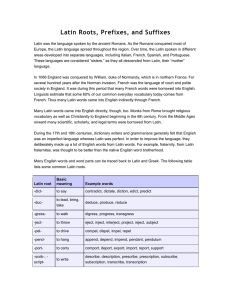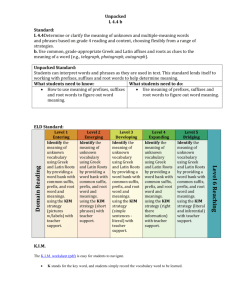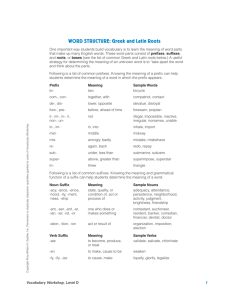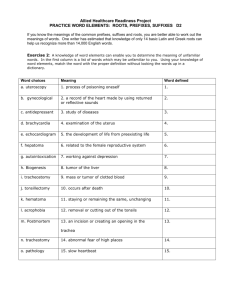Greek and Latin Roots
advertisement
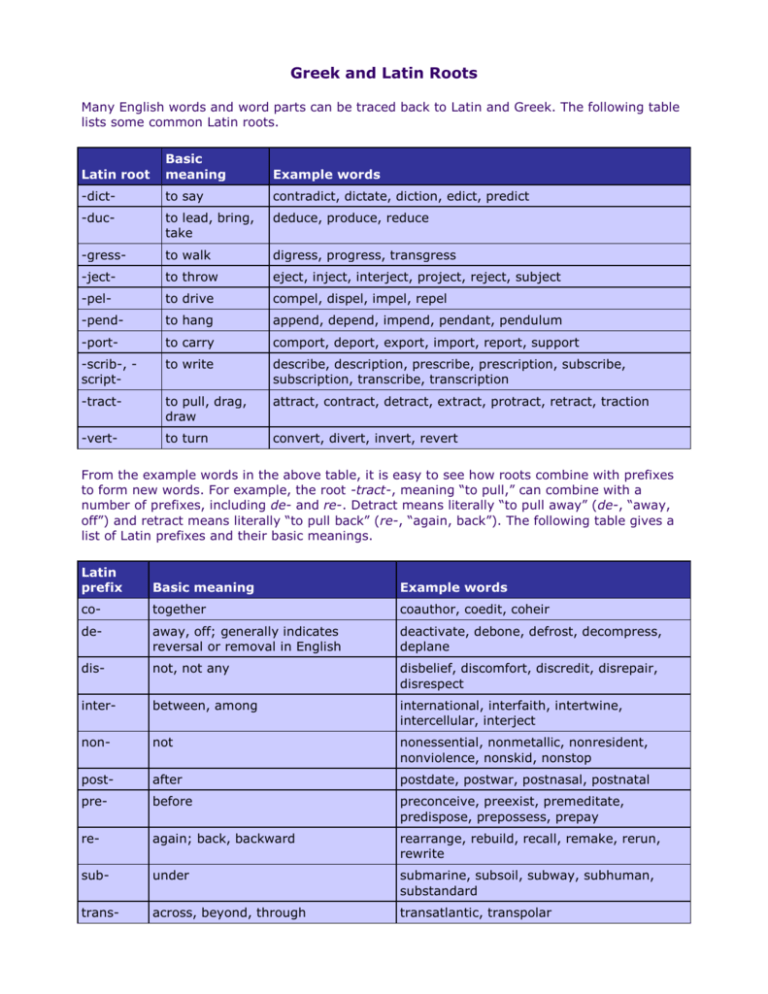
Greek and Latin Roots Many English words and word parts can be traced back to Latin and Greek. The following table lists some common Latin roots. Latin root Basic meaning Example words -dict- to say contradict, dictate, diction, edict, predict -duc- to lead, bring, take deduce, produce, reduce -gress- to walk digress, progress, transgress -ject- to throw eject, inject, interject, project, reject, subject -pel- to drive compel, dispel, impel, repel -pend- to hang append, depend, impend, pendant, pendulum -port- to carry comport, deport, export, import, report, support -scrib-, script- to write describe, description, prescribe, prescription, subscribe, subscription, transcribe, transcription -tract- to pull, drag, draw attract, contract, detract, extract, protract, retract, traction -vert- to turn convert, divert, invert, revert From the example words in the above table, it is easy to see how roots combine with prefixes to form new words. For example, the root -tract-, meaning “to pull,” can combine with a number of prefixes, including de- and re-. Detract means literally “to pull away” (de-, “away, off”) and retract means literally “to pull back” (re-, “again, back”). The following table gives a list of Latin prefixes and their basic meanings. Latin prefix Basic meaning Example words co- together coauthor, coedit, coheir de- away, off; generally indicates reversal or removal in English deactivate, debone, defrost, decompress, deplane dis- not, not any disbelief, discomfort, discredit, disrepair, disrespect inter- between, among international, interfaith, intertwine, intercellular, interject non- not nonessential, nonmetallic, nonresident, nonviolence, nonskid, nonstop post- after postdate, postwar, postnasal, postnatal pre- before preconceive, preexist, premeditate, predispose, prepossess, prepay re- again; back, backward rearrange, rebuild, recall, remake, rerun, rewrite sub- under submarine, subsoil, subway, subhuman, substandard trans- across, beyond, through transatlantic, transpolar Words and word roots may also combine with suffixes. Here are examples of some important English suffixes that come from Latin: Latin suffix Basic meaning Example words -able, ible forms adjectives and means “capable or worthy of” likable, flexible -ation forms nouns from verbs creation, civilization, automation, speculation, information -fy, -ify forms verbs and means “to make or cause to become” purify, acidify, humidify -ment forms nouns from verbs entertainment, amazement, statement, banishment -ty, -ity forms nouns from adjectives subtlety, certainty, cruelty, frailty, loyalty, royalty; eccentricity, electricity, peculiarity, similarity, technicality Greek Roots, Prefixes, and Suffixes The following table lists some common Greek roots. Greek root Basic meaning Example words -anthrop- human misanthrope, philanthropy, anthropomorphic -chron- time anachronism, chronic, chronicle, synchronize, chronometer -dem- people democracy, demography, demagogue, endemic, pandemic -morph- form amorphous, metamorphic, morphology -path- feeling, suffering empathy, sympathy, apathy, apathetic, psychopathic -pedo-, ped- child, children pediatrician, pedagogue -philo-, phil- having a strong affinity or love for philanthropy, philharmonic, philosophy -phon- sound polyphonic, cacophony, phonetics The following table gives a list of Greek prefixes and their basic meanings. Greek prefix Basic meaning Example words a-, an- without achromatic, amoral, atypical, anaerobic anti-, ant- opposite; opposing anticrime, antipollution, antacid auto- self, same autobiography, automatic, autopilot bio-, bi- life, living organism biology, biophysics, biotechnology, biopsy geo- Earth; geography geography, geomagnetism, geophysics, geopolitics hyper- excessive, excessively hyperactive, hypercritical, hypersensitive micro- small microcosm, micronucleus, microscope mono- one, single, alone monochrome, monosyllable, monoxide neo- new, recent neonatal, neophyte, neoconservatism, neofascism, neodymium pan- all panorama, panchromatic, pandemic, pantheism thermo-, therm- heat thermal, thermometer, thermostat Words and word roots may also combine with suffixes. Here are examples of some important English suffixes that come from Greek: Greek suffix Basic meaning Example words -ism forms nouns and means “the act, state, criticism, optimism, capitalism or theory of” -ist forms agent nouns from verbs ending in -ize or nouns ending in -ism and is used like -er conformist, copyist, cyclist -ize forms verbs from nouns and adjectives formalize, jeopardize, legalize, modernize, emphasize, hospitalize, industrialize, computerize -gram something written or drawn, a record cardiogram, telegram -graph something written or drawn; an instrument for writing, drawing, or recording monograph, phonograph, seismograph -logue, log speech, discourse; to speak monologue, dialogue, travelogue -logy discourse, expression; science, theory, study phraseology, biology, dermatology -meter, metry measuring device; measure spectrometer, geometry, kilometer, parameter, perimeter -oid forms adjectives and nouns and means “like, resembling” or “shape, form” humanoid, spheroid, trapezoid -phile one that loves or has a strong affinity for; loving audiophile, Francophile -phobe, phobia one that fears a specified thing; an intense fear of a specified thing agoraphobe, agoraphobia, xenophobe, xenophobia -phone sound; device that receives or emits sound; speaker of a language homophone, geophone, telephone, Francophone



